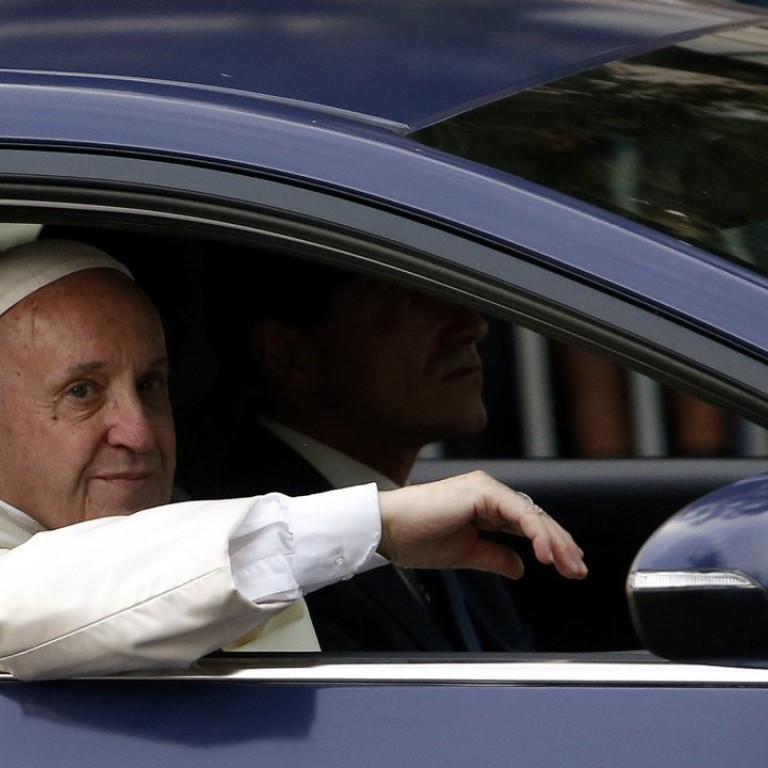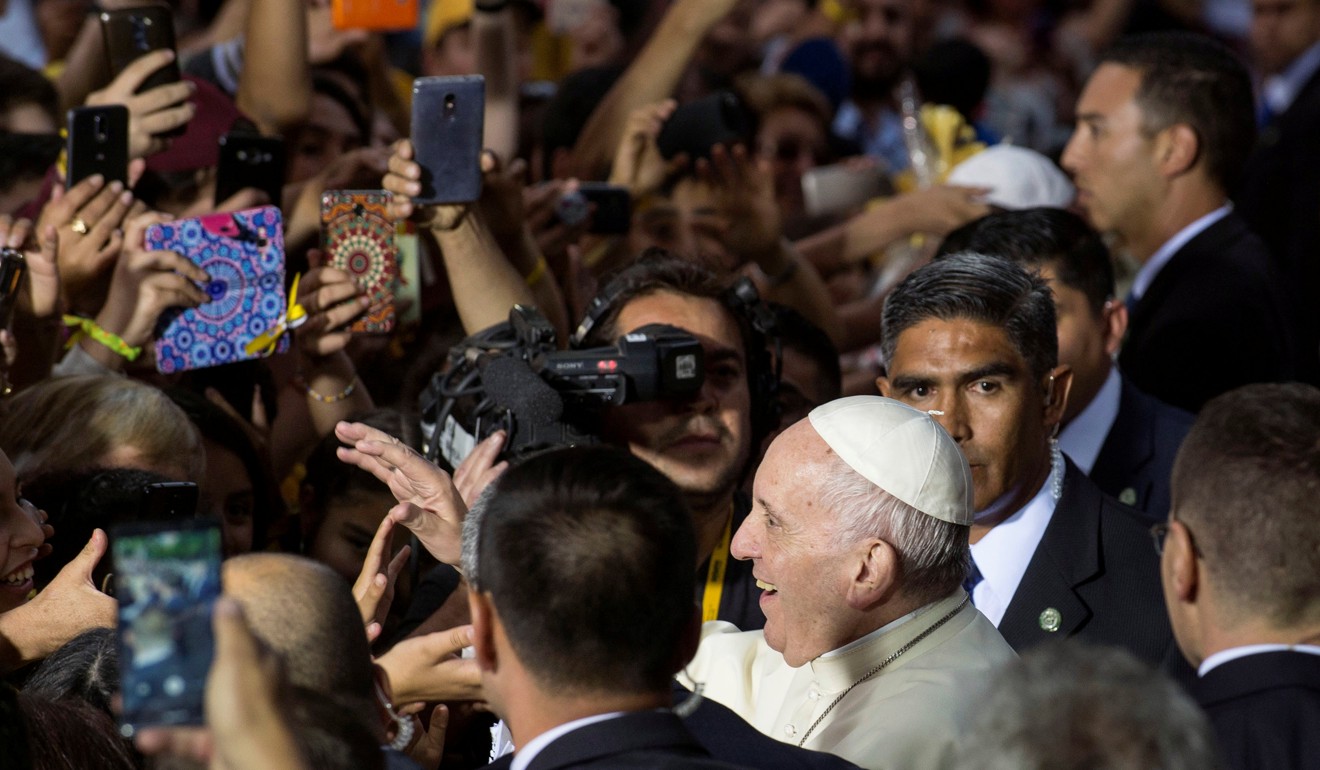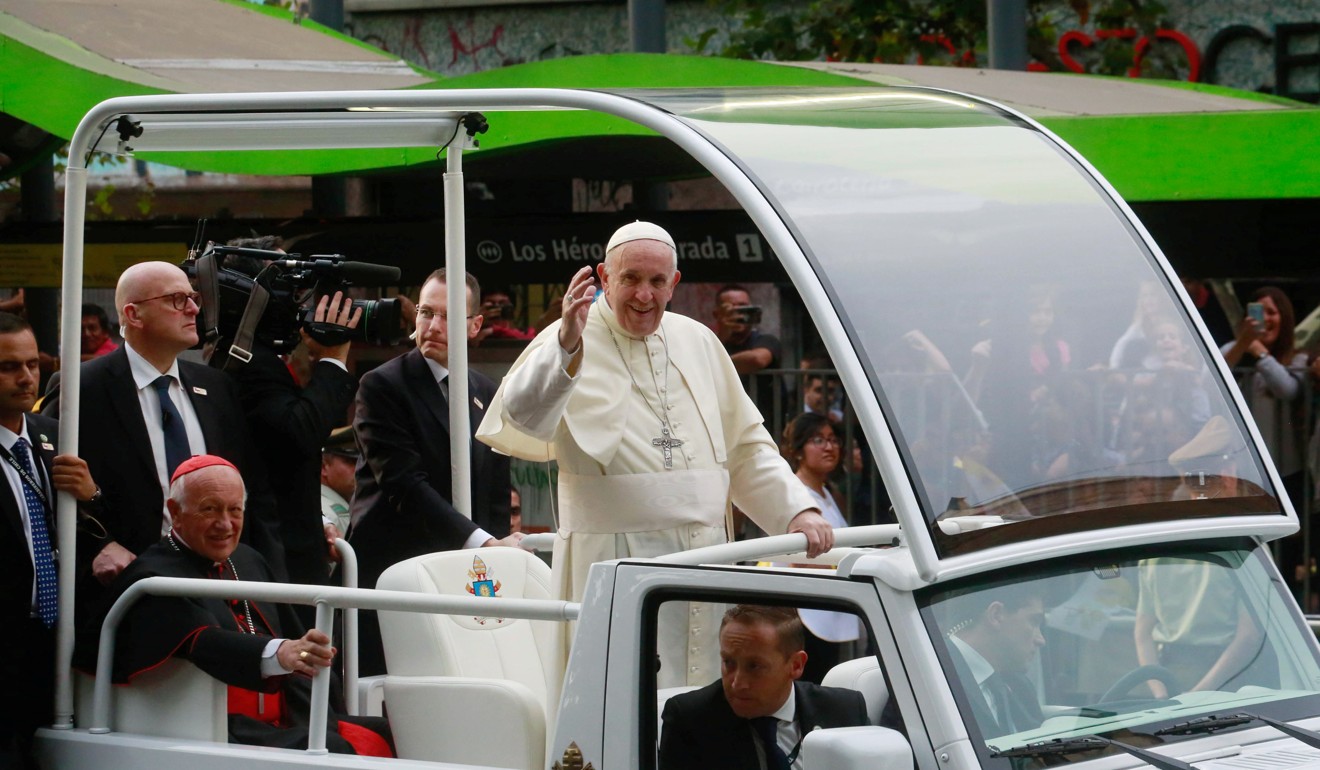
Pope Francis to tackle Amazon’s destruction, poverty and indigenous land rights on Chile tour
He also visited the tomb of a defender of human rights under the rule of Augusto Pinochet, suggesting he may speak to victims of the former dictatorship
Pope Francis arrived in the Chilean capital Monday evening to start a weeklong swing through Chile and Peru in which he is expected to highlight the plight of indigenous peoples, the destruction of the Amazon rainforest and the precarious status of immigrants and the poor.
In an eleventh-hour schedule shift, Francis stopped in Santiago at the tomb of a Chilean prelate who was known as the “bishop of the poor” and who aided those seeking loved ones detained during Chile’s former military dictatorship.
Francis was welcomed at Santiago’s international airport by Chilean President Michelle Bachelet, an agnostic. A children’s orchestra celebrated his arrival on the tarmac as the pope, who was born in neighbouring Argentina, listened with a broad smile and an aide held his cassock against a blustery wind.

His first stop, in the working-class Pudahuel district at the tomb of Chilean Bishop Enrique Alvear Urrutia, the bishop of the poor, seemed fitting.
When Francis became pope in 2013, he vowed to lead a “poor church for the poor,” embracing the values that many here say Alvear embodied.
Alvear, who died in 1982 and is a candidate for sainthood, was a fierce defender of human rights, notably during the initial years of the military dictatorship that ruled from 1973 to 1990 and was headed by General Augusto Pinochet. It was an epoch when many assailed the church leadership for failing to speak out against the abuses of the government.
But Alvear was undeterred, despite death threats and the constant risk of arrest.

The stop at the bishop’s tomb, announced shortly before the papal plane left Rome for Santiago, raised the question of whether Francis will speak about the victims of the dictatorship during his visit.
The Latin American church has long featured both conservative, pro-establishment tendencies and social activist elements, occasionally leading to tension within its hierarchy.
Pinochet’s legacy is still a deeply divisive issue in Chile, which remains a highly conservative, predominantly Roman Catholic country, despite the growth of Protestant evangelical sects.
On Monday evening, Francis switched from the Hyundai to the Popemobile during a ride through central Santiago.
Outside the apostolic nunciature, where he was to spend the evening, he embraced and bestowed blessings on adults and children – including a disabled boy – gathered there and received flowers and other gifts from well-wishers. He took off his white skullcap, or “zucchetto,” to put on one offered by a boy, then returned it to the boy and placed his own back on his head. Ecstatic Chileans who had waited for hours recorded the pope on their cellphones.
Francis begins a full schedule of public events Tuesday, which features a morning Mass at O’Higgins Park in central Santiago. The pope’s homily at the service is expected to be his first major address during the trip.
On Wednesday, he heads to the southern city of Temuco, a centre of Chile’s Mapuche indigenous population. The pope is expected to address the Mapuches’ struggle for the recuperation of ancestral lands and other rights.
A series of fire bombings at Roman Catholic churches in the Santiago area preceded the pope’s arrival. Authorities downplayed the incidents, which caused minor damage and no injuries. Police have not named suspects in the attacks.
Victims of sexual abuse by priests – an issue that has shaken the Catholic Church at its core over the last two decades – have sought a meeting with the pope. But no such session has yet been scheduled.
On Thursday, the papal visit switches to Peru, where the pope is scheduled to travel to the city of Puerto Maldonado, the gateway to Peru’s Amazon region and a centre of illicit gold mining that has ravaged the environment and forced many from their homes.
The weeklong papal visit concludes January 21 in Lima, the Peruvian capital, where the pope will recite the Angelus prayer at noon in Plaza de Armas, in the city’s historic centre.
The trip is the fourth to South America for Francis, the only pope born in the Americas.

